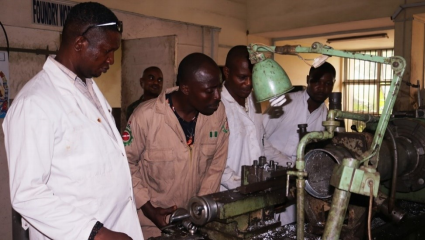
In 2005, Nigeria’s Federal Executive Council (FEC) approved a 25-year roadmap for Nigeria’s National Space Programme (Horizon 2005-2030). The major highlights of the 25-year roadmap include training a Nigerian astronaut, the capability to manufacture satellites in Nigeria by 2018, development of propulsion systems, sounding rockets and a spaceport in Nigeria by 2030, among other goals.
The specific goal to develop Nigeria’s capability in rocketry, propulsion system and a launch site by 2030 was assigned to the Centre for Space Transport and Propulsion (CSTP), one of the six operational centres of the National Space Research and Development Agency (NASRDA). The Centre is strategically situated along the Lagos lagoon in Epe, within the Lagos State University Engineering campus. Aside from Nigeria, South Africa is another African country currently developing launch vehicles and propulsion systems. – Read about South Africa’s rocket program at the University of KwaZulu-Natal (UKZN).
CSTP conducts fundamental research and development (R&D) in space transport vehicles and propulsion system. Managed by Nigerian scientists and engineers, the goal of the program is to enable NASRDA to operate a spaceport with the capability to launch various satellites into Low Earth Orbit (LEO), Geosynchronous Equatorial Orbit (GEO), and interplanetary space by 2030.
CSTP’s activities and operational departments
For the attainment of the above space capabilities, CSTP operations focus on “research and rigorous education, engineering development, design and manufacture, particularly in the areas of instrumentation, rocketry as well as data acquisition, processing, analysis and management of related software”.
The Centre’s Propulsion & Engine System (PES) unit undertakes research and development in rocket propellant and rocket engines. The unit has successfully designed and manufactured various sizes of rocket motors, rocket engine systems and used sugar-based low energy propellants as fuels for the low altitude rocket flights.
The Structural Integration Systems (SIS) unit carries out airframe design, integration of aerospace vehicle and designing fuselage for rocket launches, using composite materials. During a test flight in April 2019, the SIS unit designed and integrated all the components at CSTP, including the mobile rocket platform on which the rocket was positioned. The unit also maintained the desired angle for the rocket before the ignition of the rocket motor.
The Electronics & Simulation Systems (ESS) unit manages the avionics and communication systems and the ground station located at CSTP office complex.

Technicians and engineers at the Centre handle all manufacturing and launch activities under the Manufacturing and Launch Services division. CSTP engineers fabricate all parts of the rockets using facilities available at the Centre.
The non-technical units handle administrative and staff welfare duties, including central administration, staff welfare scheme, pension, training, asset management, public relations, HR and security.
General milestones and rocket launches:
CSTP has carried out several test launches over the years recording over 30 experimental rocket launches in the past few years (all below 10 km). The experimental flights are carried out to demonstrate the onboard instrumentations and structure integrities. See videos of some of the test launches.
CSTP launch – 2014
CSTP Launch – 2016
CSTP Launch – 2019
With 32 African satellites launched up till date, none of them was launched from Africa – NASRDA CSTP and University of KwaZulu-Natal (UKZN), South Africa are the only two government funded institutions working on the development of rocket and propulsion systems. With more funding and government support, we could be looking at African countries launching their satellites from African soil in the next few decades.









